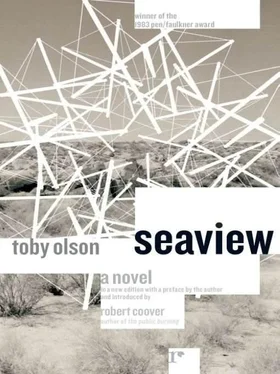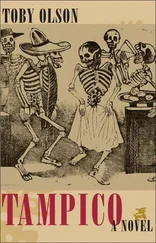“There’s the flyer!” Campbell yelled, and their heads jerked to the other side, following the line to where it entered the brush, and they saw only the curve of the back before it disappeared over the hill, the line still taut and the kite climbing higher, quickly, until it was directly above the fairway and very high. They watched as it disappeared into the clouds and the rain that was falling, weighty and a little heavier now, wetting their upturned faces.
Allen went back to the cart and got his umbrella from the attachment on his bag, opened it, and handed it to Melinda. The Chair had his out already, and he sat in the cart under it, shivering slightly, though it was not so cold, just a little wet.
“We’ve got to hit up and get out of here,” he said. “We’re taking too much time!” He looked back toward the tee, but there was no one there, no other team, waiting behind them. His voice was still a little raspy and shaky, but he had recovered a little from the events, and he got down, dropped his ball, and struck it quickly, taking no time for a practice swing. His shot was long enough, but off to the left.
“Come on, Eddie, Campbell, let’s go!” Eddie went over quickly to the place from which Allen and the Chair had hit their balls, dropped his, and hit up also. Campbell seemed not to want to leave his golf bag, but he too went over and hit, then trotted back to the cart and got in. Then the carts started and headed up the fairway toward the green.
The clatter of the two carts prevented any other noise from reaching them, and it was only when they pulled up and stopped at greenside and the motors wound down that they could hear the distant sounds coming from the direction of the lighthouse and the other side of the course. Melinda thought she could hear a horn of some kind blowing in short blasts. They heard dull thuds, faint and distant, and what they took to be the sounds of voices yelling.
“This must be it,” Campbell said, and he got down out of the cart and went to his bag in the carrier. The Chair turned and saw him reach into the slit and work at something. When his hand came out and up, he was holding a small semiautomatic rifle.
“Christ!” Costa said, when he saw it.
“Now, just a minute!” the Chair squeaked.
“You: shut the fuck up and stay here,” Campbell said, pointing at the Chair with the short barrel. “This is government business.” And he started toward the left in the direction of the third green, far up the hill. He trotted slowly in a half-crouch, the rifle hanging at the end of his arm vertical to his body.
Allen could see the flagstick out of the corner of his eye, and he turned a little that way and saw that his ball had ended where he had planned for it to end. The line was in the green, from where the ball had bounced up from the apron in a slowly turning curve to where it now rested, only about three feet from the flagstick and the hole, with an uphill lie and a putt that seemed from where he was to be straight in. He had a physical urge. His body wanted to lift up out of the seat and get down and go over and make the putt, get the ball down for their eagle. It would be easy, and he wanted to get it over with while there was still a chance for it. He needed to close it, to finish the process that he had started at the tee. It would be open-ended otherwise, like the future had been before Melinda’s illness. A good part of the future was buffered because it was circumscribed and contained now. The parameters in which prediction took place were clear and understandable, and he could handle them, like he could handle golf. But the ball was there, and it seemed to throb in the waiting, because its potential was so directed and narrow. It yearned for its death in the hole, and he throbbed and yearned with it. He felt he had to get it soon or he might not get it at all, and if he did not get it it would not just change things and push him out and away from the focus, because there was room at least for some painful stretching, but it would break him: the focus was taut, and he had real fear. He thought of the danger inherent in the system of the Tensegrity Sphere that Melinda had spoken of that day in Aspen. He fought to get out of the cart, and he fought to stay in it at the same time. He heard the sharp intake of breath beside him, turned his head to Melinda, and then looked where she was looking.
Campbell was halfway to the crest of the hill when the rifle came up and across his body. His right hand grabbed the stock, and as he came to the ground he dug it in in front of him, breaking his fall with butt and elbows, then quickly had the stock to his shoulder and the rifle sighted at the torso of a boy who had appeared, trotting on and over the upper green, coming down the hill toward them. The boy was looking back. His arms hung at his sides as he ran. His canvas workbag bounced and rattled its contents against his right knee. When he turned and saw the prone man with the weapon below him, he pulled up, dropped the bag with a thud to the ground, and raised his arms, his palms elevated and open in front of him. Campbell came up off the ground quickly, his rifle still at the ready, but then Allen saw the release of tension in his shoulder and saw him raise the barrel of the weapon, using it to motion the boy toward him. The boy picked up his bag and began to come down in a half-skip. When he reached Campbell, the man turned and came down the rest of the way with him. They could hear the structure of the boy’s voice, the rhythms in the talking, well before the two reached them.
“Chip,” Costa said, turning to the Chair as they approached the carts, the boy already in mid-paragraph, his eyes blinking, his skinny body doing its little dance.
“… and who would imagine such dark power to thwart us? Simple beachgoers, a brink of a sunny day (though some clouds), and the Chipper snatching a few deserved winks up under the truck (a toke or two to soothe him) … Hey, Chair! Hey, Eddie! … then comes Sammy, rapping the running board, and calls him out. With much eye-rubbing and half stagger up from slumber’s appassionato, he and the other lad trot over to see the ladies from cliffside. My, my, naked and two-toned down there! a good four hundred souls to the Chip’s calculations. Warm and dumbstruck I was, though felt a few wet drops to cool me. Magnifico! clean fleshy pleasures! arms alink with Sammy: two jaunty lads just watching. But some (watchamacallit) ritual of sorts going on down there: flappy freedom now and skin beach posters hooked up, and that darkling dangeroo casket for a burial of stuffed pillowed man with Air Force Station uniform on him. Felt a kind of chill, I did. Some people in dressed-up wear, heads atilt and looking up to cliffside from the beach. And then the whales! Chair! and a few souls pointing and dancing, until the beachy masses turned seaward, the Chipper’s eyes, I bet, as big as pumpkins! great bodies aroll and some splashing! It was something, Chair! You seen it Eddie, you an ocean bucko, now and previously, the Chip knows of it …
“And I am desirous of clear word power now that I have come here to tell you. There were twelve of them to my count, and that is accurate, because I was on the high prominence of the land’s overhanging figure and could see their backs, massive and glistening, when they rose and blew their silver fountains, the sun sparkling the spectrum of colors in them. Half dark over the land it was now, the clouds threatening, but seaward it was shining. The one closest in seemed to be pilot, the pivot on which they made their turning. They came, fanlike, around the lighthouse point, their row uniform, running out from their pilot into the deeper water, some space between them but a pattern in their rise and dive. The massive back of the third one out showed itself like an island, and I could see the city of barnacles and other sea life and caught wood and rigging there, a ruined city: crushed temples, viaducts, remnants of streets and busy squares, streaming riverbeds, benches and cupolas, trellises for the hanging of seaflower shades.
Читать дальше












